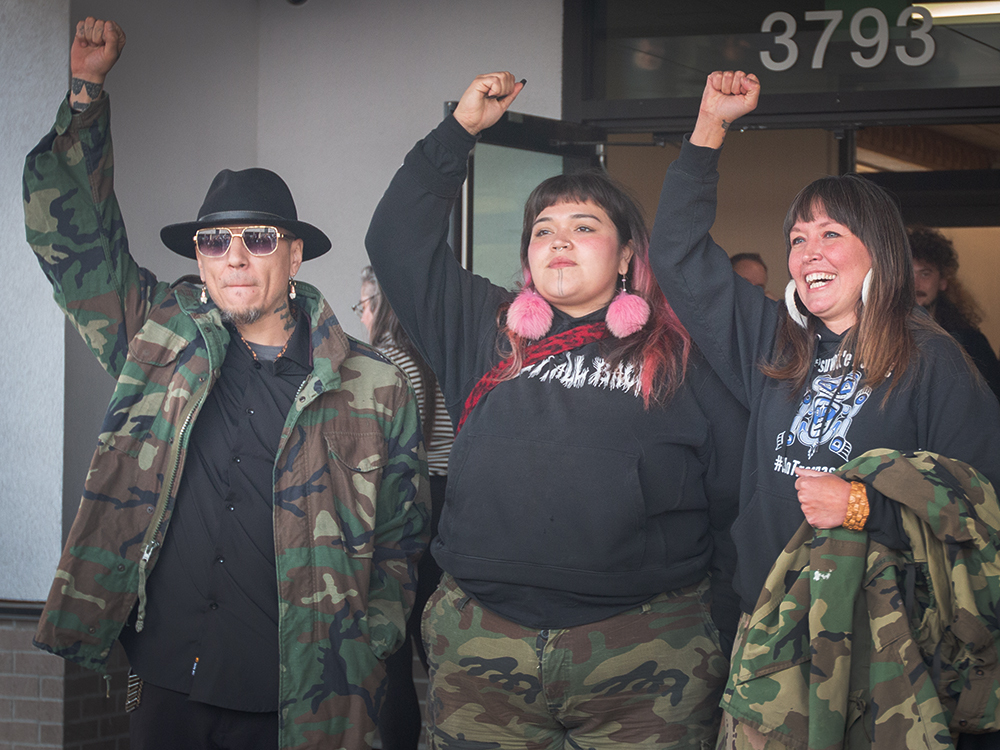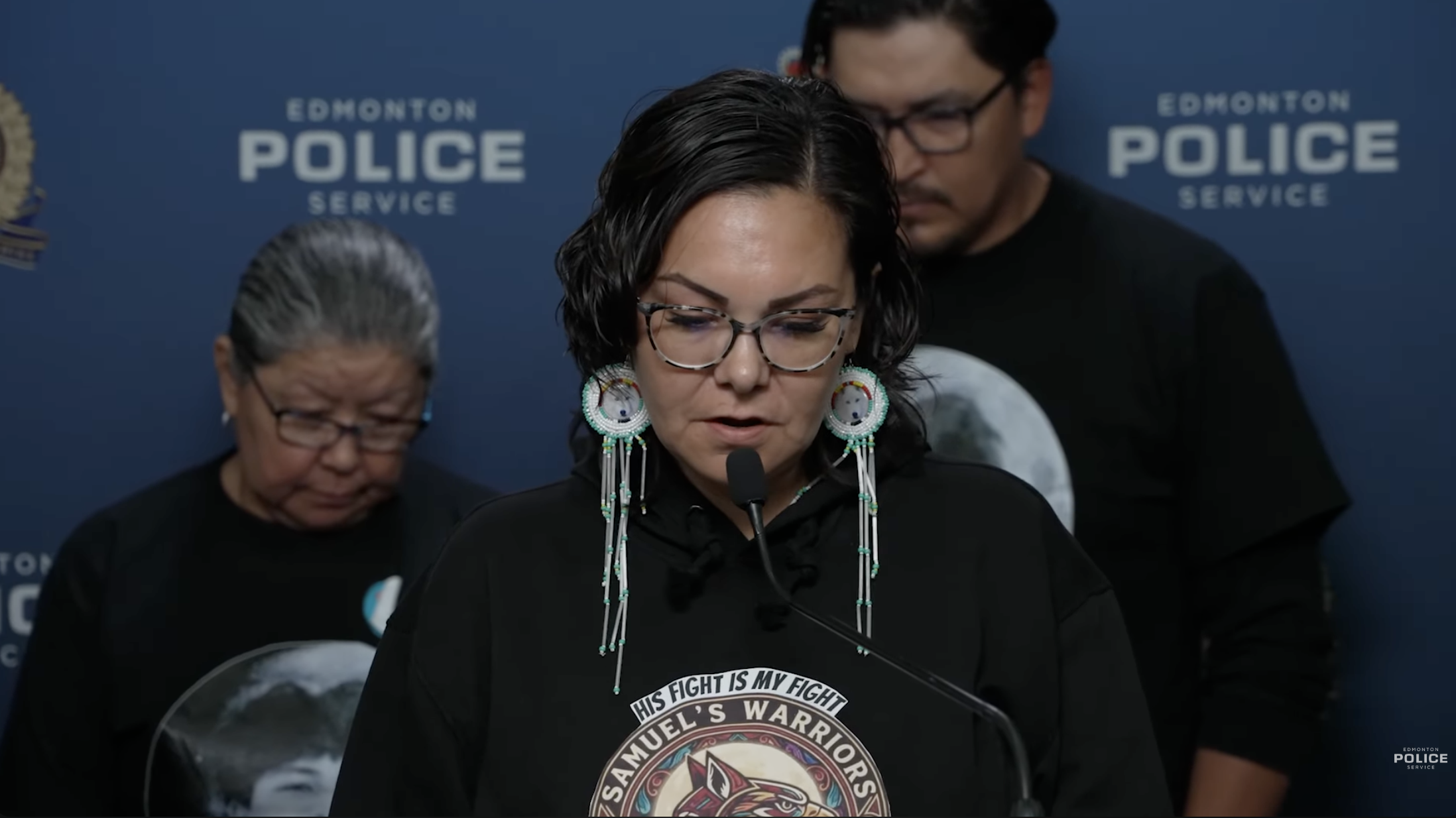Aaron Hemens shares his 2022 intentions as Okanagan Storyteller
‘To tell the community’s story, I need to be part of the community, I need to be there.’

To finish off my first full month as a storyteller at IndigiNews, I attended the Okanagan Indian Band’s (OKIB) long-awaited, grand reopening of its Cultural Arbor on May 28.
It was a day jam-packed with ceremonies, celebrations and new faces. For the community, it was a homecoming event, a return to a beloved and sacred space that has been the location of hundreds of cultural events for the syilx Nation since the 1980s. It was a “welcome home” event for the nk’maplqs people (people from the top/head of Okanagan Lake) who were displaced by the White Rock Lake Wildfire last summer. And for many, the gathering was a day to properly honour loved ones who have transcended into the Spirit World in the last few years.
For me, it was a day of many firsts. It was more than just covering a gathering. It was a day to introduce myself to the community as IndigiNews’ new Okanagan Storyteller. I met a lot of new people, shared some good laughs and had meaningful discussions. It was also my first time attending a Powwow, and I learned about the role of the Powwow’s whipman and his responsibilities.
When I received the agenda for the gathering earlier that week, it was a little daunting to see that the gathering would go from 10 a.m. to 7 p.m. I’ve never covered a full-day gathering as such, so I was worried about how I would encapsulate the entire day into one story. But I was committed to doing so, and that meant being there for the full day.
I needed to be there all day, to not only paint a complete picture of the gathering, but to establish a connection with the community and to build trust. It was the community’s special day, and it was the community’s story, not mine. Being there for half the day just wasn’t going to cut it. And while I was exhausted by the end of it, I’m glad I stayed.
I have many storytelling intentions for the year, but my biggest one is to be present. To show people I care by simply being there. And in doing that I commit myself to learning more about the community and carrying forward what I’ve learned. And a good chunk of that work can only be achieved by dedicating hours of my day to spending time with the people whose stories I’m sharing.
To sit and listen
To tell the community’s story, I need to be part of the community. I need to be there. How can I accurately, honestly and respectfully tell the community’s story if I don’t take the time to be present, to learn, to sit and to listen?
If I had left the Cultural Arbor gathering after opening remarks, like most of the other media outlets did, I wouldn’t have known about the work the OKIB’s Recovery Team is doing in the aftermath of the 2021 wildfire season. I would have missed the milestone event of Great Shirt Tyler Jensen being initiated as a whipman by his uncle, Melem’stya..Everett White. I would have missed the Powwow, and all of the beautiful music and Powwow regalia the dancers wore. The salmon dinner that filled the bellies of many. The community fashion show that wowed guests. These were all crucial details of the day that helped make the gathering what it was, so it was absolutely necessary that I be there for all of it.
I’ve been a visitor here in syilx territory for just over a year now. I spent much of 2021 working at a community newspaper in Kelowna. In that role – and even today – I observed what I would describe as grossly inadequate and inappropriate media coverage of the syilx Nation across its homelands.
Outside of IndigiNews, regional media doesn’t seem to value, appreciate or respect the voices, the time, the experiences or the history of the community. Instead, the coverage is often reactive or exploitive, and reporters focus on meeting deadlines and filling quotas. There’s little to no effort put into going into the community and spending time meeting people, or to creating relationships and listening.
Leading by example
On May 5, I attended the Ki-Low-Na Friendship Society’s honouring ceremony for Missing and Murdered Indigenous Women, Girls and Two-Spirit people (MMIWG2S). Before the gathering began, I was inside the lobby of the building, chatting with familiar faces and introducing myself to new ones. I noticed a reporter from a local online news outlet arrive and take photos of the red dresses hanging outside of the building. They entered and asked if this was where the ceremony would be taking place. But within minutes, they were gone. They didn’t even stay for the opening prayer. And about an hour later, as the ceremony was still getting underway, a “story” was up on the outlet’s website, with the contents of the article being based off of the event’s agenda that was posted earlier in the week.
No interviews. No quotes. No time given. And frankly, no respect. And I share this story because this, in a nutshell, is how the regional media operates. The community’s experiences, voices and history are not valued or appreciated. The community is simply seen as a means for story clicks, which in turn generate advertising revenue.
This type of “storytelling” is the exact opposite of what I do. I want to challenge this approach to storytelling and set an example for other media in the region through my work. As I mentioned before, if you want to tell stories about the community, you need to be a part of the community.
Stories that uplift and honour
There are a few other storytelling intentions that come to mind as well. To be a human first – a community member – and a storyteller second. To value and respect community members’ time, their experiences, their knowledge and their voices. To be mindful of people’s trauma. To listen, learn and unlearn. To be patient, understanding, caring and considerate. To create relationships, and to tell stories that uplift and honour the community.
June is shaping up to be a busy month. I’m excited for all the stories that are waiting to be told. I’ve seen the impact that my stories can have, and I’m looking forward to sharing more. But none of it would be possible if it wasn’t for the generosity and openness of the community to share their voices and experiences with me.
There’s so much that the community has to offer, and I’m just grateful to be here in this role to share that. So, thank you for having me, and for sharing your world with me.
Author
Latest Stories
-
‘Bring her home’: How Buffalo Woman was identified as Ashlee Shingoose
The Anishininew mother as been missing since 2022 — now, her family is one step closer to bringing her home as the Province of Manitoba vows to search for her
-
Land defenders who opposed CGL pipeline avoid jail time as judge acknowledges ‘legacy of colonization’
B.C. Supreme Court sentencing closes a chapter in years-long conflict in Wet’suwet’en territories that led to arrests
-
Samuel Bird’s remains found outside ‘Edmonton,’ man charged with murder
Officers say Bryan Farrell, 38, has been charged with second-degree murder and interfering with a body in relation to the teen’s death













